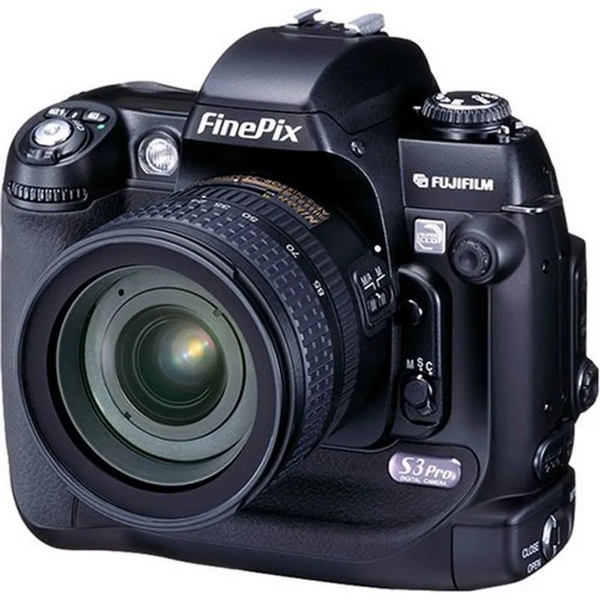
Fujifilm SLR Digital
| Brand | Fujifilm 1998 |
| Model | SLR Digital |
| Released Year | 1998 |
| Type | DSLR Cameras |
| Series | N/A |
| Color | NA |
| Optical Zoom | NA |
| Status | Discontinued |
Quick view
Overview
The Fujifilm SLR Digital was one of the pioneering digital single-lens reflex cameras released in 1998. It utilized a CCD sensor to capture images digitally, departing from traditional film technology. The camera featured interchangeable lenses, which provided versatility in photography. It incorporated an optical viewfinder typical of SLR cameras, delivering real-time composition. The device supported manual exposure controls, enhancing user creativity. Despite the relatively low resolution compared to modern cameras, it marked a significant advancement in digital imaging technology.
Specifications
| Country | Japan |
| Type | Digital Single-Lens Reflex Camera |
| Model | SLR Digital |
| Series | NA |
| Color | NA |
| Features | NA |
| Optical Zoom | NA |
| Maximum Resolution | NA |
| Battery Type | NA |
| Digital Zoom | NA |
| Maximum Aperture | NA |
| MPN | NA |
| Charger Included | NA |
| Screen Size | NA |
| Country/Region of Manufacture | NA |
| Connectivity | NA |
| Manufacturer Warranty | NA |
| UPC | NA |
| Sensor | CCD sensor |
| Lens Mount | Interchangeable lens mount |
| Viewfinder | Optical SLR viewfinder |
| ISO Range | Limited ISO sensitivity (exact values vary) |
| Storage | Early digital storage media (e.g., PCMCIA cards) |
Images
Key Advantages
The Fujifilm SLR Digital camera offered the advantage of interchangeable lenses, allowing photographers flexibility. It provided manual controls, which appealed to professionals and enthusiasts. Its optical viewfinder ensured precise framing without lag. The camera eliminated the need for film development, speeding up workflow. It was among the early adopters of digital image capture in the SLR category, paving the way for future models. Additionally, its build quality and design catered to traditional SLR users transitioning to digital.
Limitations
The Fujifilm SLR Digital was limited by its relatively low-resolution sensor compared to today’s standards. Its image quality was constrained by the early digital technology available at the time. The camera had limited ISO sensitivity range, affecting low-light performance. Storage capacity was limited by the early digital storage media it used. Its size and weight were relatively bulky due to the mirror and prism system. Battery life was also comparatively short, necessitating frequent recharging or replacement.
FAQ
When was the Fujifilm SLR Digital camera released?
The Fujifilm SLR Digital camera was released in 1998.
Does the Fujifilm SLR Digital support interchangeable lenses?
Yes, it supports interchangeable lenses compatible with the SLR mount.
Is the Fujifilm SLR Digital still available for purchase?
No, this camera model has been discontinued.
What type of sensor does the Fujifilm SLR Digital use?
It uses a CCD (charge-coupled device) sensor for image capture.
What are the main advantages of the Fujifilm SLR Digital?
Its main advantages include manual control, optical viewfinder, and interchangeable lenses.
What are some limitations of the Fujifilm SLR Digital camera?
Limitations include low resolution, limited ISO range, and short battery life.
What audience was the Fujifilm SLR Digital intended for?
It was targeted at professional photographers and enthusiasts transitioning from film to digital.
Disclaimer
The content on is provided for general informational purposes only. We do not guarantee the accuracy, completeness, or reliability of any information, specifications, or visuals presented on the site.
is not responsible for any content, images, or data uploaded or shared by users. Users are solely responsible for the content they submit.
We may include links to third-party websites for convenience. We do not endorse or take responsibility for the content or policies of any external sites.
Use of the site is at your own risk. Always verify critical information independently before making decisions based on content from this website.
